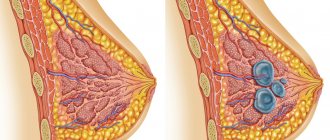Menopause is a period during which hormonal changes occur in a woman’s body.. The menopausal period is quite often caused by various symptoms that contribute to the appearance of irritability, fatigue, and insomnia.
The age at which menopause occurs can vary: from 45 to 60 years. Every woman experiences menopause differently.
Significant discomfort during this period is caused by systematic hot flashes. For each woman, these processes occur differently, however, even with a slight sensation of them, a feeling of discomfort arises.
What is tide
A hot flash is a condition in which there is a sudden increase in body temperature and then a decrease . This symptom is characterized by heavy sweating and blood flow to the upper body. This happens due to changes in the woman’s body at the hormonal level.
It is hormonal imbalances that provoke the sudden and short-term occurrence of fever in the body.
Tides can occur with strong intensity, or they can be almost imperceptible. The woman feels the heat, after a while it subsides. A thermal shock is a consequence of a malfunction of the body's thermoregulatory function.
Impact on the body
Hot flashes and other menopausal symptoms are not life-threatening, but can be stressful and affect your quality of life. They can affect psychological health and cause mild depression, irritability and mood changes. They may also reduce a woman's quality of sleep or interfere with her work or social life.
Main symptoms in women
Symptoms of fever can be expressed differently in each woman.
There are other accompanying symptoms that may be observed during menopause:
- cardiopalmus;
- nausea, urge to vomit;
- profuse sweating;
- increased body temperature for a short period of time;
- dyspnea;
- tendency to urinate frequently.
Often these symptoms occur at night . Then the woman feels tired, lack of sleep, which causes nervousness, irritability, and anxiety to appear during the day.
IMPORTANT!
Pronounced symptoms of hot flashes can be relieved with the help of hormonal drugs, herbs, infusions, medicines and folk remedies.
To reduce the severity of temperature fluctuations in the body, you can consult a doctor so that he can select remedies to alleviate the condition.
Gravity measurement
Your doctor may sometimes need to evaluate the severity of the condition to determine the most appropriate course of treatment. In such cases, the doctor may ask the woman to fill out a questionnaire. There are many questionnaires that can be used to assess menopausal hot flashes. These include:
- Kupperman index.
- Green's climacteric scale (climacteric value of menopause).
- Women's Health Questionnaire.
- Menopause quality of life questionnaire.
- Laboratory tests (such as blood or urine tests).
For what reasons can fever return after menopause?
When the hormonal levels seem to have stabilized, the hot flashes should stop. But periodically the same condition occurs as during menopause. Read also about how long hot flashes last during menopause.
Why is this happening? For what reasons can the thermoregulatory apparatus in the body be disrupted?
The appearance of fever after menopause is a fairly common phenomenon, only during this period temperature fluctuations are less noticeable, their frequency is much lower, and sweating is not as profuse as at the beginning of menopause.
Hot flashes after menopause are directly related to cardiovascular activity: vasodilation. The vasodilation reaction is provoked by neuropeptides.
The amount of neuropeptides is hereditary. They help the body tolerate thermal fluctuations, and neuropeptides also influence other processes:
- swelling;
- pressure;
- intestinal motility;
- feeling pain;
- stress resistance.
Scientists have concluded that the return of seizures is genetic in nature. According to the results of the study, it became known that it is under the influence of certain hormones that neuropeptides can mutate and contribute to the occurrence of hot flashes. As is known, the average ratio of hormones in the body can be inherited.
If fever and sweating after menopause are not associated with the action of neuropeptides, then they may be associated with diseases or pathologies in the body.
Causes of fever not related to menopause
The process of normalizing a stable temperature depends on several factors:
- general tone of the vascular system in the body . These include all vessels of the body, including vessels of the mucous systems and superficial skin;
- disruption of the endocrine system . Affects the functioning of the thyroid gland, pancreas, and adrenal glands, which, in turn, can provoke disruptions in the functioning of the cardiovascular system and thermoregulation processes;
- malfunction of the hypothalamus (a part of the brain), whose function includes the processes of maintaining a stable body temperature.
NOTE!
Malfunctions of various organs and the presence of concomitant diseases, hormonal surges can cause systematic hot flashes in women.
Hot flashes that are not associated with menopause may be temporary due to hormonal conditions at a certain point or period of time.
Violation of thermoregulation in this case can occur due to:
- pregnancy _ During pregnancy, especially in the first trimester, sudden hormonal changes occur. The hormone estrogen decreases, and adrenaline is released. This circumstance causes the dilation of blood vessels and an increase in temperature;
- menstruation _ Hot flashes during menstruation, which occur at the age of 30 or more, are harbingers of early menopause. The functioning of the ovaries may be impaired. Sometimes hormonal changes occur during menstruation, which contribute to the occurrence of hot flashes;
- eating spicy food . Taste flushes arise due to the influence of spicy food on the mucous membranes of the digestive tract, which provoke activation of the sympathetic nervous system. Sweating and a short-term increase in body temperature occur;
- influence of alcohol . Alcohol in small quantities is not capable of causing profuse sweating, although a feeling of heat may occur due to the effect of alcohol on the blood vessels. When drinking excessive amounts of alcohol, the body tries to cope with more toxins by releasing them through liquid, which is why profuse sweating and fever occur.
In addition to hot flashes that occur due to temporary phenomena, thermoregulation disorders may occur that cause systematic hot flashes. You can get rid of them only after curing the disease that provokes an increase in body temperature.
Treatment of early menopause at 30 years of age
Timely diagnosis and the correct treatment regimen make it possible to cure early menopause in women, eliminate the main symptoms of the pathology, resume menstruation, and normalize the cycle. But if time is lost, menstruation stops completely, then getting rid of early menopause is almost impossible.
If dangerous symptoms appear, it is necessary to take smears for the presence of atypical cells, determine the body mass index, and do a clinical analysis of urine and blood. You should definitely visit a mammologist and get an ECG. A blood test for hormones will also show the attenuation of ovarian function - with a high level of FSH in combination with a low amount of the hormone estrogen and progesterone, the development of early menopause can be suspected.
The basis of treatment for early menopause at the age of 30 is hormone replacement therapy - the procedure helps eliminate the main symptoms of the pathology. Hormones help improve the condition of the skin and bones, normalize the functioning of the reproductive organs, restore menstruation, and make them regular. Replacement therapy is contraindicated for uterine bleeding of unknown origin, acute hepatitis, uterine cancer, and a tendency to form blood clots.
Effective hormonal drugs for the treatment of premature menopause at 30 years of age, which contain estrogens and progestins in an optimal ratio - Divigel, Eviana, Femoston. In case of individual intolerance, it is necessary to take natural substitutes - Livial, Menopace, Climaxan. It is imperative to use medications that prevent vaginal dryness - Ovestin, Klimara.
Symptom of serious illness
As a result of pathologies of varying severity in the body, the interconnection and functioning of important organs may be disrupted . The body's thermoregulation is especially affected by disruption of the organs associated with the production of hormones.
Disorders of the thyroid gland
A malfunction of the thyroid gland contributes to disruption of the process of thermoregulation and a decrease in vascular tone . In this case, two main processes are possible that provoke disruption of the functioning of the gland:
- hypothyroidism _ It is caused by dysfunction of the thyroid gland with improper production of hormones. This pathology is often manifested by the following symptoms: lethargy, fatigue, weight gain, swelling, hot flashes. In this case, hot flashes occur quite rarely, but isolated cases of fever do occur;
- hyperthyroidism . It is characterized by increased secretion of hormones by the thyroid gland and hyperactive activity of the gland. In this case, there is a sharp weight loss, insomnia, irritability, rapid heartbeat, and bulging eyeballs. Hot flashes in this case are a characteristic sign of the disease.
Nerve cell dysfunction
This pathology refers to vegetative-vascular dystonia and is characterized by frequent hot flashes . This occurs due to a disruption of thermoregulatory processes between local receptors and the central part of the brain. In practice, the disease has a hereditary predisposition and can manifest itself in women with a heightened psycho-emotional character. Symptoms of the disease and hot flashes can occur as a result of stressful situations.
Diabetes
Diabetes mellitus refers to a pathology of the endocrine system . The development of hypoglycemia against the background of diabetes mellitus provokes the development of symptoms similar to hot flashes. In addition, obesity may develop, which in itself leads to sweating and fever.
Adrenal gland dysfunction
The function of the adrenal glands includes the production of norepinephrine and adrenaline, which are directly involved in ensuring normal body temperature and ensuring normal tone of the vascular system. Inflammatory processes in the adrenal glands provoke increased production of adrenaline, resulting in profuse sweating, nervousness, and hot flashes.
Malignant formations
A tumor in the hypothalamus region inhibits the function of this area of the brain, which leads to impaired thermoregulation and the appearance of hot flashes. When tumors form in the area of the stomach and intestines, they can signal the presence of a tumor by provoking thermal processes.
This behavior of the body in this case is a side effect on the tumor.











